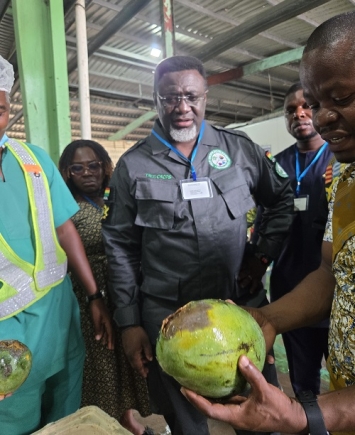
TCDA Boss unveils strategy to cut mango post-harvest losses and boost processing supply
The Chief Executive Officer of the Tree Crops Development Authority (TCDA), Dr Andy Osei Okrah, has unveiled a raft of government-backed measures aimed at tackling post-harvest losses and raw material shortages that continue to hinder the growth of Ghana’s mango industry.
Speaking during a working visit to HPW Fresh and Dry Limited and Bomarts Farms—two leading companies in mango processing and export—Dr Okrah outlined a strategic roadmap centred on improving agricultural practices, strengthening research, and increasing access to quality planting materials.
“The key to addressing post-harvest losses lies in empowering farmers through capacity-building initiatives, providing the necessary farming tools, and ensuring a steady supply of high-quality planting materials,” he said. “This approach will also enhance the raw material base needed by local mango processors and help create more employment opportunities for the youth.”
Mango remains Ghana’s second-largest tropical fruit export after pineapple, with rising demand on both domestic and international markets. The sector is recognised for its potential to diversify income sources for smallholder farmers while boosting rural livelihoods. However, significant obstacles remain. Post-harvest losses are estimated to be as high as 30%, a figure that further tightens the raw material pipeline for local processors.
Other industry challenges include rising production costs, crop diseases, and the increasing impact of climate change, notably long dry spells and flooding resulting from forest degradation. To address these hurdles, Dr Okrah advocated increased mango plantation development, greater youth involvement, and the provision of certified seedlings to support sustainable cultivation.
He commended the operational excellence and innovation at HPW Fresh and Dry and Bomarts Farms, praising their contributions to Ghana’s mango value chain and alignment with the government’s proposed 24-hour economy policy. “These institutions are not only advancing value addition but are also exemplars of how public-private collaboration can transform agriculture,” he remarked.
Bomarts Farms, co-founded by Ghanaian entrepreneur Anthony Botchway and Swiss partner Martins Suter in 1985, has evolved from three acres of pineapple into one of Ghana’s major fruit exporters. Headquartered in Nsawam in the Eastern Region, the company now employs over 400 full-time staff—60% of whom are women.
HPW Fresh and Dry Limited, situated in Adeiso, is the largest dried mango processor in West Africa. The company processes an estimated 2,400 metric tonnes of mangoes annually and works directly with over 1,700 mango farms nationwide. It currently produces more than 30 mango varieties, supplying high-standard exports to European and global markets.
Ghana’s mango production is structured around two main seasons: the major harvest runs from April to August, while a secondary season spans November to January. The industry has adopted harmonised quality norms and training standards to ensure that farmers, exporters, packhouse operators, and other actors deliver consistent, market-ready produce.
Dr Okrah concluded that with sustained investments, technical support, and collaboration, the mango sector could be a pillar of Ghana’s agricultural transformation agenda. “We have the opportunity to make mango a cornerstone of our rural economic development,” he said. “With the right interventions, this industry can deliver tangible results for farmers, processors, and the broader Ghanaian economy.”
